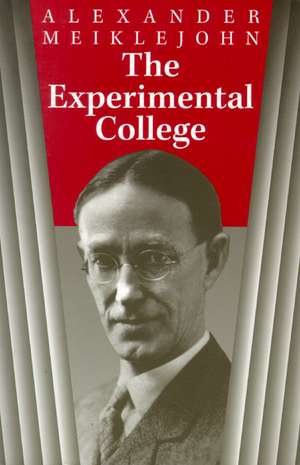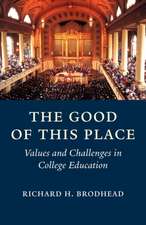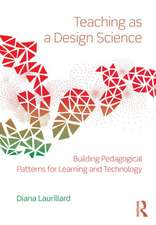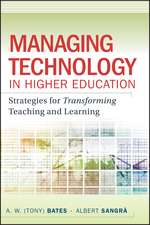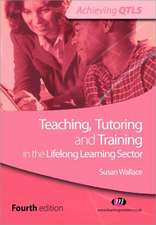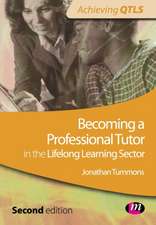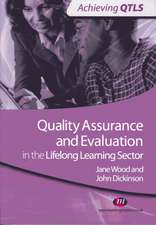The Experimental College
Autor Alexander Meiklejohnen Limba Engleză Paperback – aug 2001
First published in 1932, The Experimental College is the record of a radical experiment in university education. Established at the University of Wisconsin in Madison in 1927 by innovative educational theorist Alexander Meiklejohn, the "Experimental College" itself was to be a small, intensive, residence-based program within the larger university that provided a core curriculum of liberal education for the first two years of college.
Aimed at finding a method of teaching whereby students would gain "intelligence in the conduct of their own lives," the Experimental College gave students unprecedented freedom. Discarding major requirements, exams, lectures, and mandatory attendance, the program reshaped the student-professor relationship, abolished conventional subject divisions, and attempted to find a new curriculum that moved away from training students in crafts, trades, professions, and traditional scholarship. Meiklejohn and his colleagues attempted instead to broadly connect the democratic ideals and thinking of classical Athens with the dilemmas of daily life in modern industrial America.
The experiment became increasingly controversial within the university, perhaps for reasons related less to pedagogy than to personalities, money, and the bureaucratic realities of a large state university. Meiklejohn’s program closed its doors after only five years, but this book, his final report on the experiment, examines both its failures and its triumphs. This edition brings back into print Meiklejohn’s original, unabridged text, supplemented with a new introduction by Roland L. Guyotte. In an age of increasing fragmentation and specialization of academic studies, The Experimental College remains a useful tool in any examination of the purposes of higher education.
"Alexander Meiklejohn’s significance in the history of American education stems largely from his willingness to put ideas into action. He tested abstract philosophical theories in concrete institutional practice. The Experimental College reveals the dreams as well as the defeats of a deeply idealistic reformer. By asking sharp questions about enduring purposes of liberal democratic education, Meiklejohn presents a message that is meaningful and useful in any age."—Adam Nelson author of Education and Democracy: The Meaning of Alexander MeiklejohnAimed at finding a method of teaching whereby students would gain "intelligence in the conduct of their own lives," the Experimental College gave students unprecedented freedom. Discarding major requirements, exams, lectures, and mandatory attendance, the program reshaped the student-professor relationship, abolished conventional subject divisions, and attempted to find a new curriculum that moved away from training students in crafts, trades, professions, and traditional scholarship. Meiklejohn and his colleagues attempted instead to broadly connect the democratic ideals and thinking of classical Athens with the dilemmas of daily life in modern industrial America.
The experiment became increasingly controversial within the university, perhaps for reasons related less to pedagogy than to personalities, money, and the bureaucratic realities of a large state university. Meiklejohn’s program closed its doors after only five years, but this book, his final report on the experiment, examines both its failures and its triumphs. This edition brings back into print Meiklejohn’s original, unabridged text, supplemented with a new introduction by Roland L. Guyotte. In an age of increasing fragmentation and specialization of academic studies, The Experimental College remains a useful tool in any examination of the purposes of higher education.
o A reprint of the unabridged, original 1932 edition
o Published in partnership with the University of Wisconsin–Madison Libraries
Preț: 221.78 lei
Nou
Puncte Express: 333
Preț estimativ în valută:
42.45€ • 46.13$ • 35.68£
42.45€ • 46.13$ • 35.68£
Carte tipărită la comandă
Livrare economică 21 aprilie-05 mai
Preluare comenzi: 021 569.72.76
Specificații
ISBN-13: 9780299172442
ISBN-10: 0299172449
Pagini: 470
Dimensiuni: 152 x 229 x 30 mm
Greutate: 0.54 kg
Ediția:1
Editura: University of Wisconsin Press
Colecția University of Wisconsin Press
ISBN-10: 0299172449
Pagini: 470
Dimensiuni: 152 x 229 x 30 mm
Greutate: 0.54 kg
Ediția:1
Editura: University of Wisconsin Press
Colecția University of Wisconsin Press
Recenzii
"The normal young American expects, and is led to expect, on his twenty-first birthday, not a new sense of responsibility, but a new automobile, a new set of opportunities for self-gratification. The Experimental College rests upon the assertion that, against the specialized teaching of men for banking, for scholarship, for industry, for art, for medicine, and the like, there is the general liberal teaching of men for intelligence in the conduct of their own lives."—Alexander Meiklejohn, 1932
Notă biografică
Alexander Meiklejohn (1872–1964) was the author of many articles and books, including Free Speech and Its Relation to Self-Government. Educated in philosophy at Brown and Cornell universities, he became a dean at Brown and then president of Amherst College. In 1925, he was invited by Glenn Frank, president of the University of Wisconsin in Madison, to establish the Experimental College. Meiklejohn later founded the San Francisco School of Social Studies, a pioneering adult education program. He received the Presidential Medal of Freedom in 1963 for his activities in defense of First Amendment freedoms of speech, press, and assembly during the McCarthy era.
Descriere
First published in 1932, The Experimental College is the record of a radical experiment in university education. Established at the University of Wisconsin in Madison in 1927 by innovative educational theorist Alexander Meiklejohn, the "Experimental College" itself was to be a small, intensive, residence-based program within the larger university that provided a core curriculum of liberal education for the first two years of college.
Aimed at finding a method of teaching whereby students would gain "intelligence in the conduct of their own lives," the Experimental College gave students unprecedented freedom. Discarding major requirements, exams, lectures, and mandatory attendance, the program reshaped the student-professor relationship, abolished conventional subject divisions, and attempted to find a new curriculum that moved away from training students in crafts, trades, professions, and traditional scholarship. Meiklejohn and his colleagues attempted instead to broadly connect the democratic ideals and thinking of classical Athens with the dilemmas of daily life in modern industrial America.
The experiment became increasingly controversial within the university, perhaps for reasons related less to pedagogy than to personalities, money, and the bureaucratic realities of a large state university. Meiklejohn’s program closed its doors after only five years, but this book, his final report on the experiment, examines both its failures and its triumphs. This edition brings back into print Meiklejohn’s original, unabridged text, supplemented with a new introduction by Roland L. Guyotte. In an age of increasing fragmentation and specialization of academic studies, The Experimental College remains a useful tool in any examination of the purposes of higher education.
"Alexander Meiklejohn’s significance in the history of American education stems largely from his willingness to put ideas into action. He tested abstract philosophical theories in concrete institutional practice. The Experimental College reveals the dreams as well as the defeats of a deeply idealistic reformer. By asking sharp questions about enduring purposes of liberal democratic education, Meiklejohn presents a message that is meaningful and useful in any age."—Adam Nelson author of Education and Democracy: The Meaning of Alexander MeiklejohnAimed at finding a method of teaching whereby students would gain "intelligence in the conduct of their own lives," the Experimental College gave students unprecedented freedom. Discarding major requirements, exams, lectures, and mandatory attendance, the program reshaped the student-professor relationship, abolished conventional subject divisions, and attempted to find a new curriculum that moved away from training students in crafts, trades, professions, and traditional scholarship. Meiklejohn and his colleagues attempted instead to broadly connect the democratic ideals and thinking of classical Athens with the dilemmas of daily life in modern industrial America.
The experiment became increasingly controversial within the university, perhaps for reasons related less to pedagogy than to personalities, money, and the bureaucratic realities of a large state university. Meiklejohn’s program closed its doors after only five years, but this book, his final report on the experiment, examines both its failures and its triumphs. This edition brings back into print Meiklejohn’s original, unabridged text, supplemented with a new introduction by Roland L. Guyotte. In an age of increasing fragmentation and specialization of academic studies, The Experimental College remains a useful tool in any examination of the purposes of higher education.
o A reprint of the unabridged, original 1932 edition
o Published in partnership with the University of Wisconsin–Madison Libraries
